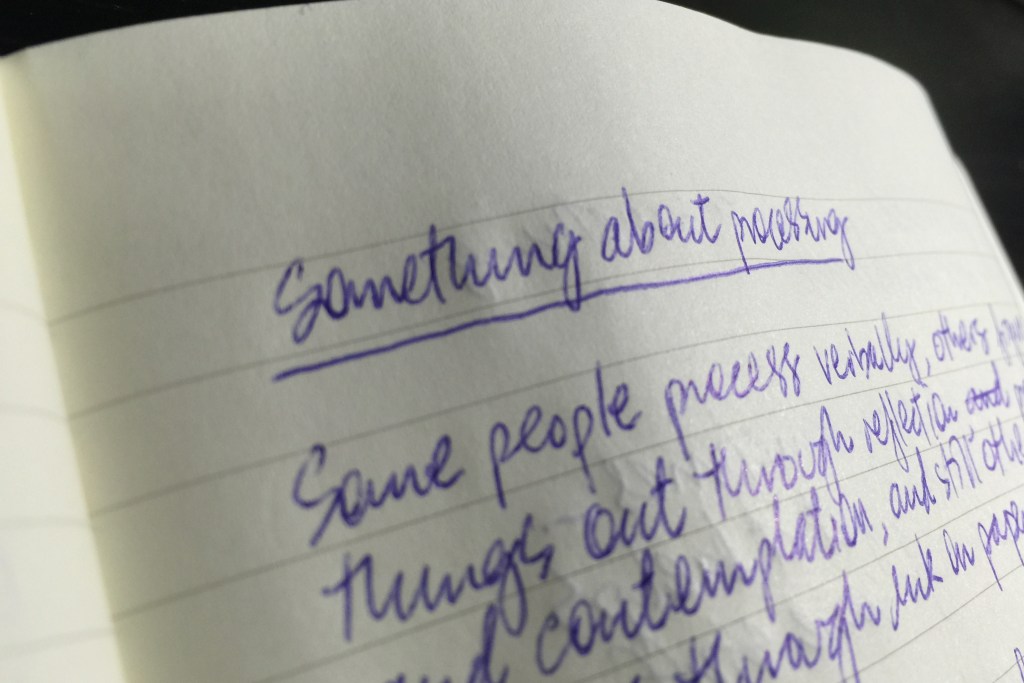
Something about processing
Some people process verbally, others figure things out through reflection and contemplation, and still others through ink on paper.
There’s probably a bunch of others who don’t process at all.
My wife, Fi, is most certainly a verbal processor. It probably doesn’t work particularly well for her to be married to someone who’s asleep moments after their head hits the pillow. More than once, I’ve fallen asleep between questions one and two (I know, Muriel, I’m terrible).
We often quote a line from a movie that I’ve long since forgotten which has someone droning:“on and on she talks, each word more meaningless than the one before”.
Sometimes, I just need to get a pen, some paper, a quiet or caffeinated place and start writing. Prayerfully and attentively; ‘Every step an arrival’.
I’m not talking keyboard either; I think I can type quicker than I can write and on these occasions, this is a processing disadvantage. When it’s about getting stuff out of my head, pen and paper can be my happy pace for processing.
I’m there right now.
The writing process, if this is you, is cathartic. What is being expressed needn’t be particularly monumental or world-changing, but the measured approach and attentiveness becomes a processing pathway. A conduit for mindfulness.
A little like going for a run sometimes; it’s good in and of itself, yet it’s also a space where you can work your head away as well.
Julia Cameron talks about ‘Morning Pages’ in her book, ‘The right to write’. Morning Pages are three pages of longhand, stream of consciousness writing, done first thing in the morning. No filter, no content demands, just kickstarting your writing engine.
Cameron says that morning pages “provoke, clarify, comfort, cajole, prioritize and synchronise the day at hand”.
I’m highly irregular in my morning pages, but I get the notion. Writing breeds writing.
Morning pages may be one of the ways that you come before God each morning — part of a quiet time or devotional rhythm — but it’s achieving a similar end: it’s a pathway for intimacy with God.
Our methods for processing are neither singular nor uniform. Much like the diversity with which we worship and bring glory to God, the bigger deal is that we do rather than how we do it.
Earlier today I felt as though I just needed to write something. There was stuff that was weighty for me; I needed to dump it on paper or share it with someone! This was seized by an even stronger thought: ‘you need to get God’s Word into you’. Writing should never be a means of Holy Spirit-avoidance, rather one of the ways you chase after Him.
Lock it up inside and sooner or later you’re going to have an Elsa moment and freeze out your world. But knowing the places you got to process pain, joy, and hurt? That’s important.
Where you head with these things is an even bigger deal, but these words are about the medium: finding the mode, the people, and the triggers that facilitate rather than impede that process for you.
Is there one best way? Yep, yours. If you haven’t found the way you process stuff, it’s worth trying a few options, but the strength of another’s recommendation should only cause you to consider giving it a whirl rather than feeling compelled to make it your own.
As I mentioned, where you head with your stuff is a bigger deal than how you get there, but it’s worth figuring the how all the same.
Ah-ha! Helpful! I was just contemplating how best to discover my approach. Investigation now to follow!